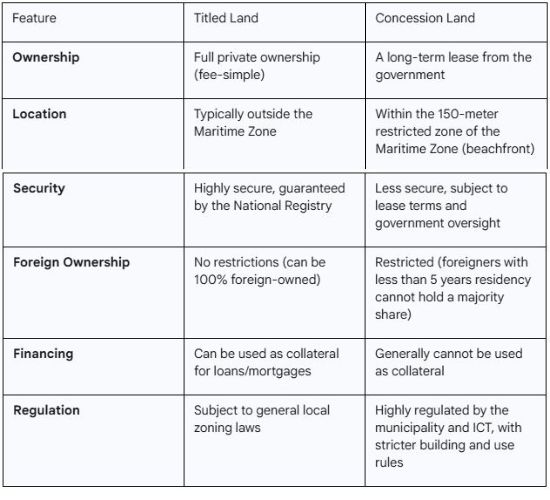Legal and Title Guidance
Titled Land
Titled land is what most people in other countries consider “normal” property ownership.2
- Ownership: You have full, private ownership of the land.3 This is also known as “fee-simple” ownership.4 The property has a registered title deed in the National Registry of Costa Rica, which serves as ultimate proof of ownership.5
- Location: Titled land is typically located outside of the Maritime Zone, which is a 200-meter-wide strip of land along the coastline.6
- Security: This is considered the most secure form of land ownership in Costa Rica.7 The government guarantees the title, and it cannot be taken away by the government except in rare cases of expropriation for public interest, which requires compensation.8
- Foreign Ownership: Foreigners can own 100% of titled land in their own name or through a corporation, with equal rights to Costa Rican citizens.9
- Financing: Titled land can be used as collateral for a loan or mortgage, making it easier to finance development or a purchase.
- Regulation: While still subject to local zoning and building regulations, titled land generally has less government oversight compared to concession land.10
Concession Land
Concession land is a specific type of property found primarily in the Maritime Zone, which is a 200-meter strip of land from the high-tide line.11
- Ownership: You do not own the land outright.12 Instead, you are granted a long-term lease, or “concession,” from the Costa Rican government, which is the true owner of the land.13
- Location: Concession land is the 150-meter portion of the Maritime Zone, after the first 50 meters (which is a public zone that cannot be owned or developed).14 This is why concession land is almost always beachfront or very near the beach.
- Security: Concession land is essentially a lease for a specific period, usually 20 years, with the possibility of renewal.15 While renewals are common if you have complied with the terms of the concession, they are not guaranteed. The government can also change the terms of the lease or decide not to renew it.16
- Foreign Ownership: There are significant restrictions for foreigners.17 To hold a concession, a foreigner must either have been a legal resident for five years or, more commonly, hold the concession through a corporation that is at least 51% owned by a Costa Rican citizen.18
- Financing: Concession land generally cannot be used as collateral for a loan, which makes it difficult to get a mortgage or construction loan.19
- Regulation: Concession land is heavily regulated by both the local municipality and the Costa Rican Tourism Institute (ICT).20 There are strict rules regarding building heights, zoning, and environmental impact.21
Summary Chart Titled vs. Concession



